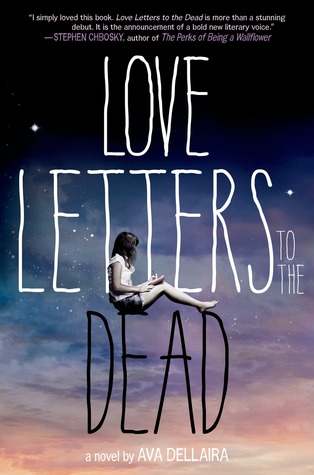 |
| Title: Love Letters To the Dead Author: Ava Dellaira Published: April 1, 2014 Publisher: Farrar, Straus, and Giroux (BYR) |
YA books that deal with death and grief aren’t exactly thin on the ground. As I write this, I’m looking over one of my bookshelves and picking out the Children’s and YA titles. In almost every one, there is a dead parent, a dead sibling, a dead friend. This frequency of death and absence in literature has registered vaguely in my brain before, but looking over my collection now, I’m feeling some fresh realization.
In regards to Children’s Lit, deaths become a sort of plot aide. Without parents underfoot, children can go on adventures, be resourceful, and express atypical cleverness. This is why Children’s Literature is overflowing with orphans. The trope seems more than a little dark. But, for most children, death is not yet a real thing. I remember, as a child, how death was a comfortable part of my fiction.
In the YA genre, grief makes its appearance. Which makes sense. Unless you are fortunate, by adolescence, you will have experienced the death of a beloved person with the lucidity of a mostly-developed brain. It is your first grief, and this experience has its place in Young Adult literature, along with first loves and first heartbreaks.
Ava Dellaira’s Love Letters to the Dead is quite blatantly a book about death. It explores the very peculiar and air-taking problem that follows the death of a person who in some way defined you. Who am I now without you? Who do I become without your presence?
Our protagonist, Laurel, comes to us just a few months after her sister May’s death. From the start of the novel, we understand that May was a large part of Laurel’s identity, and her absence leaves Laurel feeling like an utterly blank slate. Laurel decides to construct an identity for herself, and the plot unfolds from there.
On the surface, the narration is entirely epistolary, with Laurel writing notebooks of letters to famous dead people. However, I’d argue that the novel is really diary narration in disguise. To my understanding, Laurel does not know herself, so she addresses her diary to other people. This prominent device helps Love Letters to the Dead stand out from other YA issue-books, but did make for choppy reading at times. For each addressee — Kurt Cobain, Judy Garland, River Phoenix, Amelia Earhart, and Allan Lane are the regulars — Laurel writes a little summary of their life and accomplishments, which read, at times, like grade school reports. I met most of them with impatience, wanting to get back to the plot. The two exceptions were Laurel’s breakdowns of Kurt Cobain’s suicide note and River Phoenix’s experiences as a child in a cult known for child sexual abuse. Both of these moments were gripping and enhanced the plot, rather than detracting from it.
Mostly, however, Laurel’s remarks to the dead are entities detached from the storyline, which is populated with characters in supporting roles with supporting problems. Laurel’s parents, aunt, and English teacher make up the only adult presence in the novel; mostly, the story is occupied by Laurel’s band of high school friends. Each of these friends has a clear-cut issue, which often made them seem like case studies of at-risk teens, rather than three-dimensional characters. This is probably the main reason I can only give Love Letters to the Dead 3.5 stars. Excepting Laurel and May — who is vividly present through Laurel’s memories — Dellaira’s characters were flat as playing cards. Perhaps the diary/letter narration is partially to blame. The nature of that style of writing does not allow for the kind of rich description and close detail that can be accomplished when a writer does not have to accurately mimic a 9th grade voice.
This is not to say the book is without successes. Laurel’s characterization was an accomplishment, consistent and complex. Aptly named, she has a strong poetic streak, which only occasionally veers into purple prose territory. She is an earnest, but unreliable narrator — a liar of omission, with a warren of repressed memories. Laurel, the only person present at May’s death, refuses to tell family and friends if her sister’s fatal fall from a bridge was an accident or suicide. She keeps the secret from us as well, only tossing us small clues, until the end of the book, when the full scope of the tragedy is revealed in full.
May’s character was another force in Love Letters to the Dead. She reminded me very strongly of Charlie Kahn from the incredible Please Ignore Vera Dietz. Both May and Charlie are only real to us through the memories of people maddened by grief. They are deified, preserved, distilled, and spiced with nostalgia. Sad and beautiful mysteries to unpack.
Ultimately, Love Letters to the Dead left me conflicted. I did not wholly enjoy this book, nor did I wholly dislike it. It had moments that left me very moved, and shortcomings that left me frustrated. However, I can say definitively that Dellaira was unafraid and admirable in exploring morally complex subject matter, and has given us a thought-provoking, if imperfect, read.

No comments: